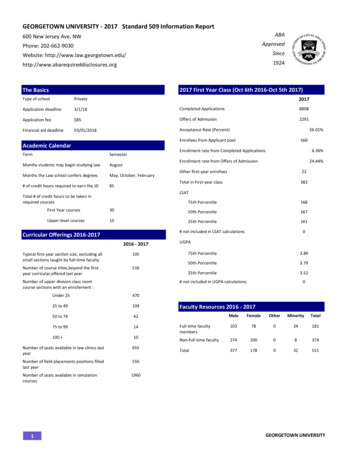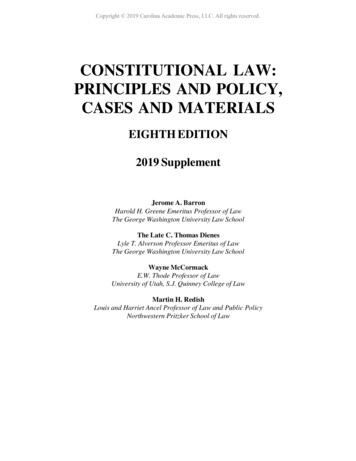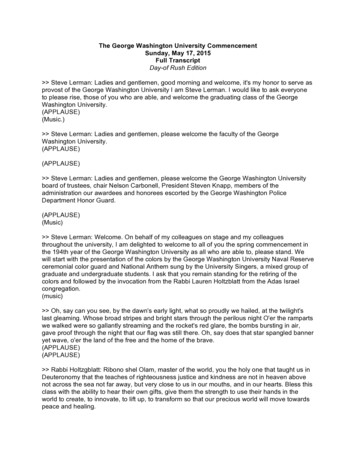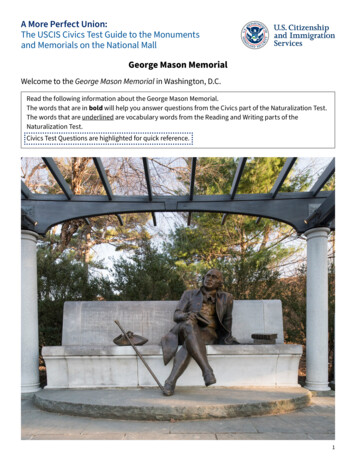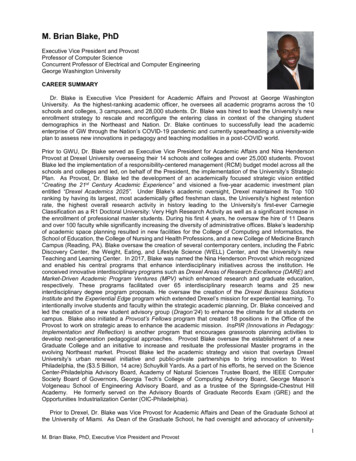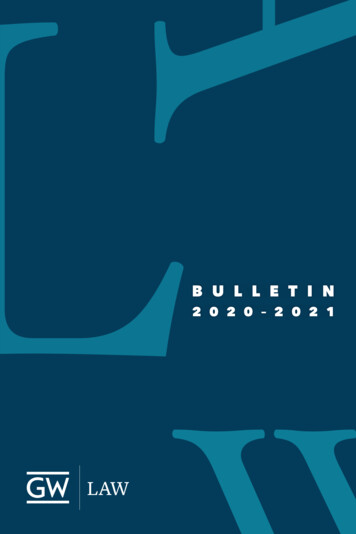
Transcription
THE GEORGE WASHINGTON UNIVERSITYLAW SCHOOL BULLETIN 2020–2021Please address correspondence to the office concerned atThe George Washington University Law School,2000 H Street, NW, Washington, D.C. 20052;telephone (202) 994-6288.For information concerning programs in otherschools of the University, please visit www.gwu.edu.www.law.gwu.edu
As a founding member of the Association of American Law Schools, The GeorgeWashington University Law School subscribes to that Association’s bylaws, includingthe following statements: “A member school shall provide equality of opportunity inlegal education for all persons, including faculty and employees with respect to hiring,continuation, promotion and tenure, applicants for admission, enrolled students, andgraduates, without discrimination or segregation on the ground of race, color, religion,national origin, sex, age, handicap or disability, or sexual orientation. A member schoolshall seek to have a faculty, staff, and student body which are diverse with respect torace, color, and sex.”The University reserves the right to change courses, programs, fees, and the academiccalendar, or to make other changes deemed necessary or desirable, giving advance noticeof change when possible.
ContentsThe Academic Calendar 2020–2021.6The George Washington University Law School . 7The Juris Doctor (J.D.) Degree .9Entrance Requirements.9Admissions Process .9Degree Requirements .11Academic Regulations . 14Joint Juris Doctor–Master’s Degree Programs .24Graduate Programs.26The Master of Laws (LL.M.) Degree .26Entrance Requirements .26Admissions Process .26Degree Requirements . 27Joint Master of Laws–Master’s Degree Programs. 41The Doctor of Juridical Science (S.J.D.) Degree . 46Entrance Requirements . 46Degree Requirements . 47The Master of Studies in Law Degree .48Concentrations .48Entrance Requirements .48Degree Requirements .48Admissions Process . 49General Information .50Day and Evening Classes .50Registration .50Graduation Requirements .50Transcripts of Record .51Academic Integrity Code .51Spring, Summer, and Exchange Programs . 52Fees and Financial Regulations . 55Financial Aid .59Awards .68Student Activities and Student Life .71Enrichment Program .71Publications .71Advocacy and Skills Boards .72Professional Development: Inns of Court and Foundations of Practice Programs .72Law Student Organizations. 73Facilities and Services. 75The Jacob Burns Law Library . 75Center for Professional Development and Career Strategy (The Career Center) . 75Supplemental Legal Education . 75Housing .76Student Health Service .76Health, Accident, and Tuition Insurance .76Immunization Requirements. 77Disability Support Services . 77Counseling Services . 77
University Regulations . 78University Policy on Equal Opportunity . 78University Policy on the Release of Student Information . 78Policy Regarding Students Called to Active Military Duty . 78Right to Change Rules and Programs .79Right to Dismiss Students.79Property Responsibility .79Student Conduct .79Courses of Instruction . 81Learning Outcomes . 81Planning a Balanced Program. 81Career Planning and Course Selection .82Clinical Program . 83Field Placement Program . 83Public Interest and Public Service .84Practice Areas .84Course Descriptions .98Alphabetical List of Courses .157The University . 163History and Organization . 163Academic Status . 163The Board of Trustees of the University.164Trustees Emeriti . 165Officers of Administration . 165The University . 165The Law School .166The Law Library .166GW Alumni Association . 167George Washington Law Alumni Association. 167Law School Advisory Councils . 168Faculty and Staff of Instruction . 172Index .196
6THE GEORGE WASHINGTON UNIVERSITY LAW SCHOOLThe Academic Calendar 2020–2021Fall 2020August 11-14Tuesday-FridayAugust 17 MondayAugust 21 FridayAugust 24 MondayAugust 30September 7September 14October 12October 13October 14-16November 23November 24-27Nov. 30-Dec. 2December dayOrientation – International LL.M. andExchange (Monday-Friday), Transfer(Tuesday), 1L Evening (Tuesday & Thursday),1L Day (Wednesday, Thursday, & Friday)Classes begin for 1L and International LL.M.studentsU.S. LL.M. OrientationClasses begin for 2L, 3L, 4L, and U.S. LL.M.students; first day of Add/DropLast day of Add/DropLabor Day holiday (no classes)Last day for Credit/No Credit Option1L Reading Period1L Mid-Term exams1L Fall RecessLast day of classesThanksgiving RecessReading period or snow daysExamination periodSpring 2021January 4January 10January 18January 25February 15March 1-5April ayApril 14-16 Wednesday-FridayApril 19-30 Monday-FridayMay 16 SundayClasses begin for all students; first day ofAdd/DropLast day of Add/DropMartin Luther King, Jr. Day (no classes)Last day for Credit/No Credit OptionWashington’s Birthday holiday (no classes)Spring Recess (no classes)Constructive Monday (only Monday classesheld); last day of the semesterReading period or snow daysExamination periodUniversity Commencement and Law SchoolDiploma CeremonySummer 2021May 17May 21May 28May 31June 18MondayFridayFridayMondayFridayJuly 1 ThursdayJuly 5 MondayJuly 6-8 Tuesday-ThursdayAll classes begin; first day of Add/DropLast Day for Add/Drop – In Records OfficeLast day for Credit/No Credit OptionMemorial Day holiday (no classes)Juneteenth - Freedom Day (observed; noclasses)Last day of most classes (See schedule)Fourth of July holiday observed (no classes)Examination period
THE GEORGE WASHINGTON UNIVERSITY LAW SCHOOL7The George Washington University Law SchoolHistoryThe George Washington University Law School, the oldest law school in the District ofColumbia, was established in 1865 with a formal program of two years of study. This was largelythrough the efforts of the Reverend Whitefield Samson, President of Columbian College,whose action resulted in the purchase of a separate building for holding law classes. Thebuilding had belonged to Trinity Church, of which Francis Scott Key had been Senior Warden.It was occupied by the Law School until 1884.Sixty graduates, from 22 of the then 37 states, received degrees in 1867. The school continued to have a student body and a faculty that reflected the fact that it was at the seat of ournation’s government. Supreme Court Justices David J. Brewer and John Marshall Harlan wereamong the prominent members of the bench and bar who were on the faculty.In 1877, one year after the first such program was adopted in the United States, the LawSchool instituted a course leading to the degree of Master of Laws. In 1898, the course of instruction for the degree of Bachelor of Laws was extended to three years. The Law School tookpart in 1900 in the organization of the Association of American Law Schools.In the past century, the Law School expanded its course and seminar offerings with consideration of the needs of first-degree and graduate students. The degree of Doctor of JuridicalScience was instituted in 1940. In 1946, the Law School began accepting foreign attorneysinto specially designated programs. Today, lawyers from other countries are accepted into theMaster of Laws program.In 1954, the National University School of Law, which had held an important place in legaleducation in the District of Columbia since 1869, was absorbed by the George WashingtonUniversity Law School.Since 1954, special programs of advanced study have enriched the basic curriculum. Atpresent these include Environmental and Energy Law; Intellectual Property Law; International and Comparative Law; Government Procurement Law; Litigation and Dispute Resolution; National Security and U.S. Foreign Relations Law; National Security and CybersecurityLaw; and Business and Finance Law. These special programs and other areas of study reflectthe breadth in public and private law for which the Law School is well known. Additionally, aclinical law program has been developed that is equal to that of any law school in the nation.Location in the Nation’s CapitalOf special significance is the location of the Law School in a central area of the nation’s capital,the focal point of the law in action, both U.S. and international. The work of the school goeson in this environment and presents a unique opportunity for observation and study of federalagencies—judicial, legislative, and administrative. Students and faculty have ready access tothe Supreme Court of the United States, the federal and local trial and appellate courts ofthe District of Columbia, and federal courts of special jurisdiction, such as the U.S. Courtof Appeals for the Federal Circuit, the U.S. Tax Court, and the U.S. Court of Appeals for theArmed Forces. Current federal legislation can be studied as it is considered by congressionalcommittees and as it comes up for debate on the floors of the House of Representatives andthe Senate. With respect to the federal administrative agencies, students in Washington havematchless opportunities for study and observation. They can attend informal and formal
8THE GEORGE WASHINGTON UNIVERSITY LAW SCHOOLagency hearings and can obtain from the docket complete records of administrative adjudication in specific cases. Illustrative of such federal agencies are the Federal Trade Commission inthe field of trade regulation; the Securities and Exchange Commission in the field of securityissues and corporate finance; the National Labor Relations Board in the field of labor–management relations; the U.S. Patent and Trademark Office in the field of patent law; the FederalEnergy Regulatory Commission in the fields of water, natural gas, and electric power; and theFederal Communications Commission in the areas of broadband, broadcast and cable television, international telecommunications, radio, satellite, telephone, and wireless.Washington also affords the exceptional research library collections in the Library ofCongress, the various departments of the federal government, and the libraries of the headquarters of national and international organizations. The notable library of the Carnegie Foundation for International Peace has been acquired by the George Washington University for useby research students in international and comparative law.While in law school, students participate in the life of their community. In the case of theGeorge Washington University Law School, the community includes the three branches of thegovernment of the United States. As a consequence, the study of law takes on added meaning,whether the goal be government service, private practice, business, or public interest law.ObjectivesThe purpose of the Law School is to prepare individuals to meet the needs of society in manyfields of law and to encourage scholarly research and writing in the law. The Law School doesnot emphasize any particular geographic area in its instruction; rather, it prepares students topractice law in any part of the country. The Law School seeks to fulfill these objectives througha rich and varied curriculum taught by eminent professors and highly qualified affiliated instructors; an extensive clinical law program in which students learn legal skills by actual practice;nine law journals that focus on energy and environmental law, communications law, the U.S.Court of Appeals for the Federal Circuit, general law, government contracts law, intellectualproperty law, international law, international law in domestic courts, and business and financelaw; trial practice; participation in both intra- and interscholastic trial and appellate level mootcourt competitions; a series of student professional co-curricular activities; advanced studiesfor students from the U.S. and abroad; a supplemental legal education program for membersof the bar, providing them the opportunity to take course work within the curriculum; andscholarly research and writing in the law.Student BodyThe Law School has a total enrollment of about 1,700. Approximately 1,400 students are inthe full-time day program for the J.D. degree and 100 are enrolled in the part-time (evening)program; about 150 students, many from abroad, are enrolled in graduate law degree programs.3
THE JURIS DOCTOR (J.D.) DEGREE9The Juris Doctor ( J.D.) DegreeEntrance RequirementsTo be considered for admission as a candidate for the Juris Doctor degree, an applicant musthave a bachelor’s degree awarded by a regionally accredited U.S. college or university or equivalent degree from a recognized non-U.S. institution and must have taken the Law School Admission Test (LSAT) within the past five years. There are no inflexible standards for admission, norare there minimum undergraduate grade-point averages or LSAT scores. However, applicantswhose undergraduate records and LSAT scores indicate a high probability of success in lawstudy are more likely to be admitted. Other factors in the admission decision include the applicant’s personal statement, undergraduate school attended, major and trend in grades, personalachievements, and letters of recommendation. The Law School also seeks social, ethnic,cultural, and geographical diversity in its student body.Information concerning the LSAT may be obtained from the Law School’s AdmissionsOffice or from the Law School Admission Council (LSAC) at www.lsac.org. Applicants applyingthough the Colonial Law Program (GW juniors) may submit SAT, ACT, or GRE sores in lieu ofthe LSAT. Applicants applying through the GRE pilot program may submit GRE scores in lieuof the LSAT. Information concerning the GRE may be obtained from the Educational TestingService (www.ets.org).Admissions ProcessAn applicant to the J.D. degree program may apply to attend as either a full-time or part-timestudent. Beginning J.D. degree students may matriculate only in the fall semester. Since admission decisions are made on a rolling basis, applicants are urged to submit application forms andcomplete credentials well in advance of the March 1 deadline.Applicants should register with the Credential Assembly Service (CAS) online at www.lsac.org. A transcript from each college or university attended should then be sent directly to LSAC.Transcripts from U.S. institutions must be sent to LSAC, 662 Penn Street, Box 2000-M,Newtown, PA 18940. Transcripts from foreign institutions must be sent to LSAC, 662 PennStreet, Box 8502, Newtown, PA 18940. The CAS will analyze the transcript(s) and send a copyto all law schools to which an applicant has applied. Prior to enrollment, students must submitvia LSAC a final official transcript showing evidence of the receipt of a bachelor’s degree.Advanced Standing (Transfer Students)Students may transfer to the Law School after completing one year of legal studies at a lawschool accredited by the American Bar Association (ABA). The primary factor considered inan admission decision is the student’s first-year performance. No applicant will be acceptedfor transfer who is ineligible to return in good standing to a previously attended law school.Transfer students may apply for admission to the Law School for either the fall or springsemester. The deadlines for submission of transfer applications are June 15 for the fall semesterand November 15 for the spring semester.Students may transfer a maximum of 31 credit hours from prior studies at an ABA-accredited law school; in order for a course to be eligible for transfer credit, a grade of C- or better(under the previous school’s grading system) must have been earned. Students who seek totransfer credits from an ABA-accredited law school are prohibited from seeking advancedstanding for law studies outside the United States. All courses for which credit hours are trans-
10THE GEORGE WASHINGTON UNIVERSITY LAW SCHOOLferred will be reflected on the Law School transcript with grades of Transfer (TR). Transferredcredit hours will have no effect on the Law School grade-point average. Transfer students areeligible for all academic honors and awards conferred by GW Law.All students are required to complete the required first-year curriculum. A transfer studentwho, upon matriculation, has not completed one or more of these courses at his or herprior law school must complete any required course the first time the class is offered for thestudent’s program.The Law School publishes information to supplement the Bulletin that summarizesacademic rules and regulations that apply to transfer students; all students who transfer to theLaw School are responsible for conforming to its requirements. The supplement is provided tostudents upon their admission.Transfer Early ActionApplicants who apply for fall transfer admission by March 1 will automatically be consideredthrough the Law School’s Early Action Program and will be notified of a decision by earlyApril. An applicant must have three reported grades from the first semester on his or herofficial law school transcript. Second semester grades are not needed to apply through EarlyAction, though admission is contingent upon maintaining a B average for the remaining firstyear courses. Admission through Early Action is non-binding.Non-U.S. Law School GraduatesA limited number of graduates of non-U.S. law schools who wish to prepare for law practicein the United States may be admitted to the J.D. program. A student in this program whocompletes 28 credit hours of course work at the Law School with a grade-point average of2.0 or above may petition the Academic Scholarship Committee to be granted 28 hours ofadvanced standing for law studies outside the U.S. and thereby earn the J.D. degree in two years.Students who seek advanced standing for law studies outside the U.S. are prohibited fromtransferring credits from an ABA-accredited law school. A student whose average is below 2.0after taking 28 hours of course work must complete the full J.D. program, which requires 84hours of course work.Students will be admitted to this program only for the fall semester. The deadline for application materials is March 1, but applicants are encouraged to submit applications well inadvance of the deadline.Master of Laws–Juris Doctor Transfer ProgramNon-U.S. law school graduates enrolled in the Law School’s LL.M. program may apply for admission to the J.D. program for the year following completion of their LL.M. degree. A limitednumber of outstanding students will be offered admission each year. Students admitted throughthis program may begin J.D. studies in the fall semester of the year of their admission only.To be considered for transfer admission applicants must do the following: notify the J.D.Admissions Office (admissions@law.gwu.edu) in writing of their interest by February 1 oftheir second semester of LL.M. enrollment; successfully complete at least one course fromthe required J.D. curriculum during their first semester of LL.M. enrollment; and take eitherthe Law School Admission Test (LSAT) or the Graduate Record Examination (GRE) no laterthan May 1. In addition, applicants must request that copies of all official records from prioracademic institutions attended and the Test of English as a Foreign Language (TOEFL) or International English Language Testing System (IELTS) scores be sent from the InternationalGraduate Programs Office to the J.D. Admissions Office; these documents and a completed
THE JURIS DOCTOR (J.D.) DEGREE11J.D. transfer application with GW Law transcript, submitted via LSAC, are due in the J.D.Admissions Office by May 15. Please note that the LSAT/GRE score is just one of a number offactors that is considered for admission into the LL.M.-J.D. Transfer Program.Students admitted to the J.D. program will be treated as transfer students. Upon beginningthe J.D. program, they will receive 28 credits of advanced standing for legal studies completedoutside of the United States. Students can thus complete the LL.M. degree in one year and theJ.D. degree in an additional two years. The Law School is committed to providing administrative and other similar logistical support for LL.M.-J.D. transfer students.Visiting (Unclassified) StudentsA law student who is in good academic standing as a degree candidate at an ABA-approved lawschool may be admitted to the Law School as an unclassified student and earn credit for transferto his or her law school. Students may apply for visit
THE GEORGE WASHINGTON UNIVERSITY LAW SCHOOL BULLETIN 2020-2021 Please address correspondence to the office concerned at The George Washington University Law School, 2000 H Street, NW, Washington, D.C. 20052; telephone (202) 994-6288. For information concerning programs in other schools of the University, please visit www.gwu.edu. www.law.gwu.edu


